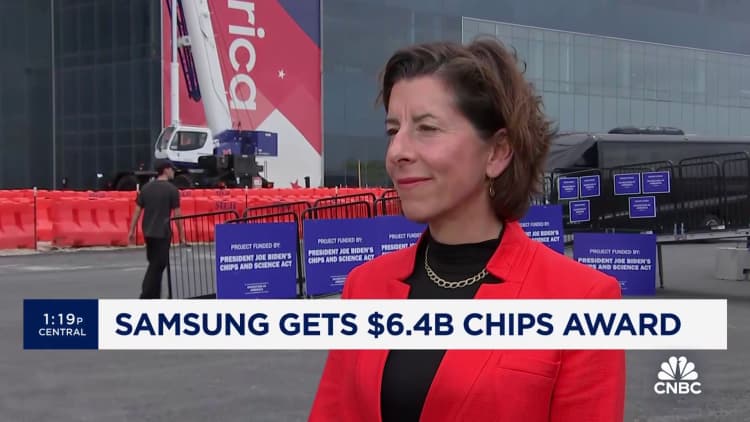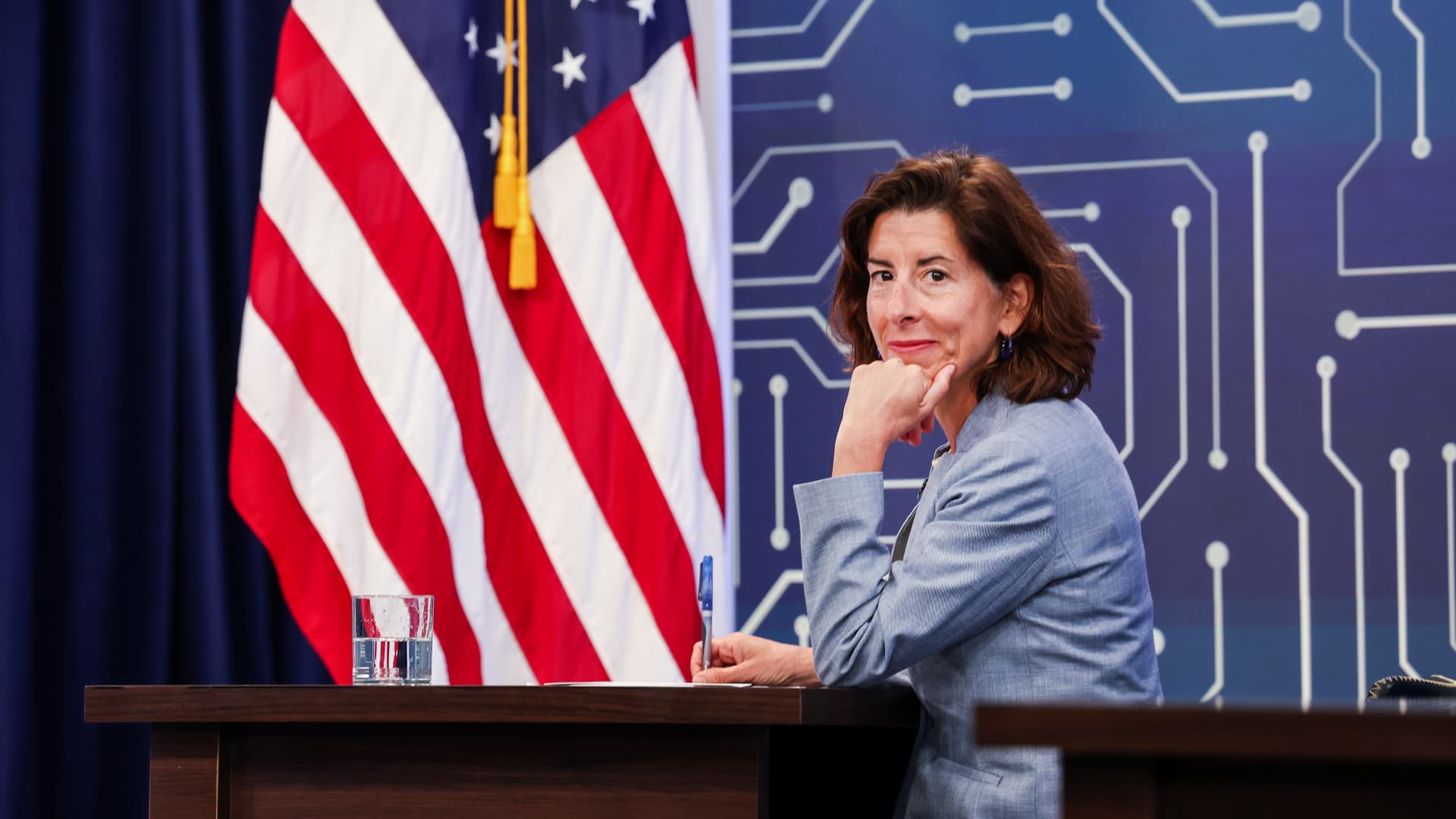WASHINGTON, DC – JULY 25: U.S. Secretary of Commerce Gina Raimondo listens as U.S. President Joe Biden participates virtually in a meeting on the Creating Helpful Incentives to Produce Semiconductors (CHIPS) for America Act, in the South Court Auditorium at the White House on July 25, 2022 in Washington, DC.
Anna Moneymaker | Getty Images News | Getty Images
On Monday, when U.S. Secretary of Commerce Gina Raimondo was in Texas to tour a new Samsung semiconductor plant being built with financial support from the CHIPS Act, the CEO of the South Korean conglomerate’s chip division pulled the Commerce Secretary aside to show her where the building would be that houses on-campus child care and an on-campus job training center.
Recalling the encounter in an interview with CNBC’s Sara Eisen at CNBC’s inaugural Changemakers Summit in New York City on Thursday, Raimondo said the Samsung executive added, “That’s what we do in Korea, and we know its works, and of course we will do it here.”
The interaction had a back story. The U.S. government tied CHIPs Act funding, worth billions to companies, to plans to provide access to child-care services to employees. That didn’t go over well with all lawmakers.
“Certain politicians on Capitol Hill didn’t like my stance, but folks running these companies who know they need top talent understand,” she said. “Anyone who thinks child care is social policy is deeply misguided and doesn’t know how to run a business,” added Raimondo, who was named to CNBC’s first Changemakers list earlier this year.
Raimondo, who was a lawyer early in her career before rising to general partner at a venture capital firm and finally to Rhode Island governor — and who has two teenage children now — said offering access to affordable high-quality child care doesn’t mean a company has to provide it on site, but it does mean that just like companies provide healthcare and paid leave and make investments in programs like continuing education, child care needs to be a core benefit.
“I was not prescribing a way for them to do it. What we were saying is if you want taxpayer money you must prove to us you’ll be successful,” Raimondo said, adding that companies won’t be successful without finding and retaining the best talent. “Child care is core to enabling women to work,” she said.

It is also proven in economic terms, according to Jessica Chang, co-founder & CEO of child-care services provider Upwards, which provides access to child-care benefits and services to Amazon, the U.S. Army and other corporate and government clients. During a separate session at CNBC Changemakers, she pointed to a recent study from the Boston Consulting Group that measured the return on investment from child-care access at between 90% and 425%. The same study found that retaining as few as 1% of eligible employees because of child-care benefits — Chang said she had to leave a job when she first became a mother — can cover the cost of offering them to the total employee population.
“What they don’t tell you when you decide to start a family is it should be the happiest day of your life but for women you’re given a choice: you can have a career or family. I was put to that choice, and the choice wasn’t mine to make. It was society’s,” Chang said in the Changemakers interview with CNBC’s Julia Boorstin. She explained that if she stayed in her career, her entire post-tax pay would have gone to child care, and all of the child care providers in her area were waitlisted. Even if she could find a spot, “I could go back to work and not spend time with my child and also not add to my family [finances].”
“Enough is enough. We’ve got to solve this now,” said Chang, who was named to CNBC’s first Changemakers list earlier this year. Chang recalled that when she was fundraising for her startup, she was sitting in a final meeting with a whole partner group, “and a male partner came in and said, ‘I don’t understand … is this a real issue? I didn’t really go through this, so how many people are really thinking child care is an issue? And why are you calling it a crisis?’ … If I could do it again, I would say I should have just walked out of the room.”
There is also a history of research endorsed by the business community showing that it’s not just women in the workforce but the early education of the next generation of workers that is at stake, including a 2019 study from the U.S. Chamber of Commerce, the largest business trade group.
“The business community really has to raise its voice and echo it’s not social policy, it’s economic policy,” said Raimondo, who is overseeing a Commerce Department budget that has ballooned from a historical average of $10 billion to $150 billion. “If you want a strong economy, women have to participate and in order for that to happen, we need strong child care,” she said. “Companies need to have more women in top jobs and the only way to get there is to help them get there, and child care is a key piece of the puzzle.”
Raimondo noted that half of Americans live in a “child care desert,” with not enough services available at a cost that is affordable.
“I’m trying to raise my voice that this is a commercial issue, not just a women’s issue or social issue,” said Raimondo, who will host a Commerce Department child care summit in June.

